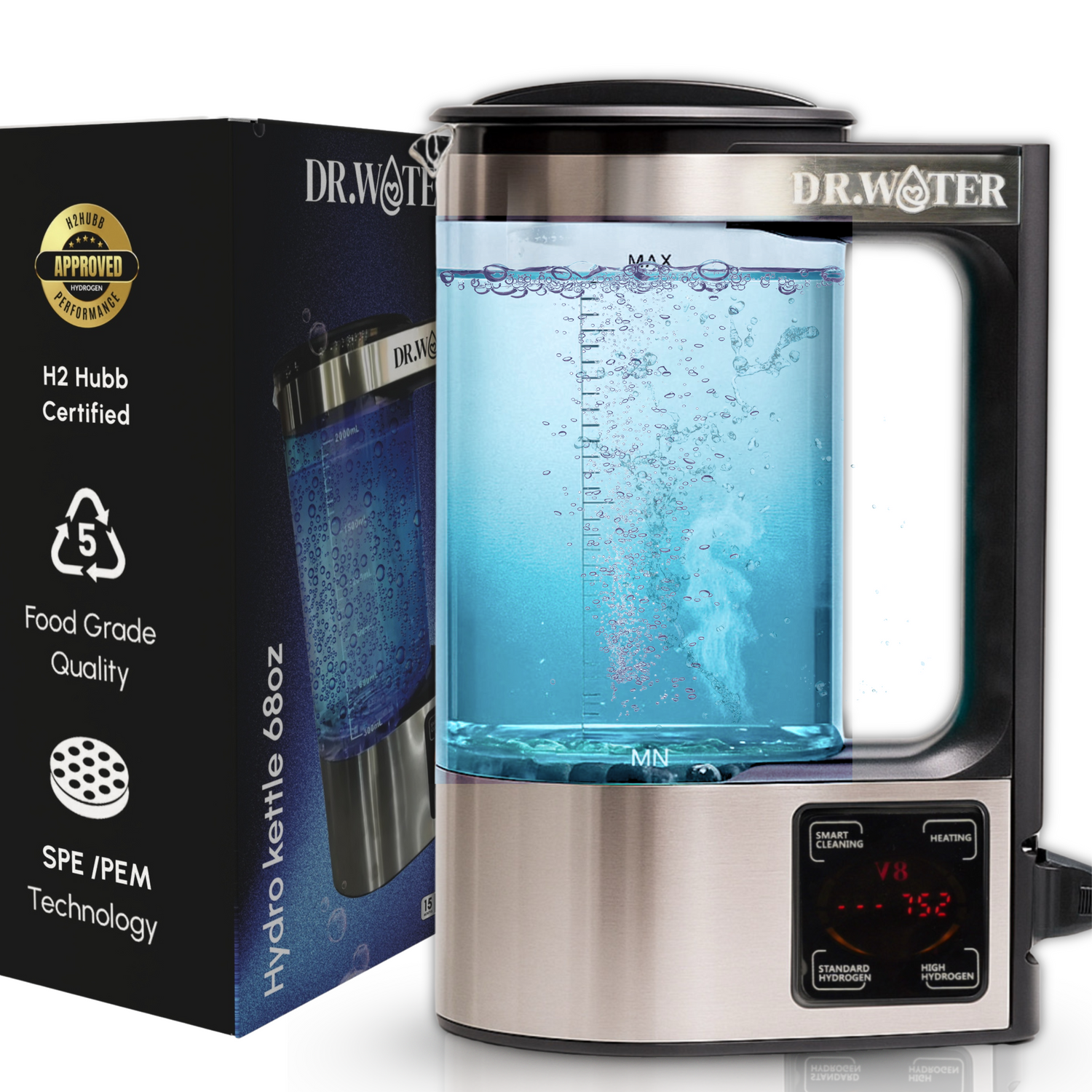
A Clear Comparison of Hydrogen Water and Alkaline Ionized Water
Share
Summary
|
Hydrogen water and alkaline ionized water are often mistaken for one another, but they differ in composition, production, and effects. Some believe alkaline ionized water contains hydrogen, while others assume hydrogen water is always alkaline - both are misconceptions.
This blog breaks down their key differences to clarify what each truly offers. Before comparing them directly, let’s first define what hydrogen water is.
What Is Hydrogen Water and How Is It Made?

Hydrogen water is regular water (H₂O) infused with molecular hydrogen gas (H₂), a powerful antioxidant. Unlike mineral-rich alkaline ionized water, hydrogen water's key feature is its high concentration of dissolved hydrogen molecules, which are believed to help combat oxidative stress.
It is produced by dissolving pure molecular hydrogen into water through methods like:
- Electrolysis: Splitting water molecules, releasing hydrogen gas, which is then dissolved back.
- Magnesium Reactors: Magnesium reacts with water, producing molecular hydrogen.
- Hydrogen Tablets & Bottles: Pre-packaged forms that release hydrogen upon activation.
Is Hydrogen Water the Same as Alkaline Water?
Hydrogen water is not necessarily alkaline. Its pH remains neutral (around 7) or slightly acidic, depending on the source. The presence of molecular hydrogen has nothing to do with altering the pH, making it distinct from alkaline ionized water.
Why Is Hydrogen Water Researched?
Molecular hydrogen (H₂) is studied for its potential to neutralise oxidative stress, reduce inflammation, and support cellular health due to its ability to penetrate cell membranes and mitochondria.
Research explores its possible benefits for conditions linked to oxidative damage, such as metabolic disorders, neurodegenerative diseases, and athletic recovery.
What Makes Alkaline Ionized Water Different and How Is It Created?

Alkaline ionized water is water that has undergone electrolysis, where an electric current separates it into acidic and alkaline streams.
The alkaline portion, enriched with minerals like calcium and magnesium, is consumed for its higher pH and potential effects on hydration and acid-base balance.
To create alkaline ionized water, electrolysis is used to alter its composition. Water passes through an electrolysis chamber, where an electric current separates it into two distinct streams:
- Alkaline water (rich in hydroxide ions, OH⁻) for drinking.
- Acidic water (H⁺ dominant) is a byproduct.
As a result, the alkaline portion experiences a rise in pH, typically ranging from 8 to 10, depending on the minerals present in the source water.
It does not “neutralise” body acidity in a broad sense - the body regulates pH through internal mechanisms, mainly via the kidneys and lungs.
Scientific and Chemical Differences: Hydrogen and Alkaline Ionized Water

While both hydrogen water and alkaline ionized water undergo electrolysis, their final compositions, properties, and functions differ. The key distinction lies in what the process adds to the water, either molecular hydrogen (H₂) or alkaline minerals.
Molecular Hydrogen vs. Alkaline Minerals
The fundamental difference between hydrogen water and alkaline ionized water lies in what each contains after processing. While both undergo electrolysis, the resulting water has distinct properties and functions.
- Hydrogen Water is infused with molecular hydrogen (H₂), which dissolves in water without altering its pH.
- Alkaline Ionized Water gains hydroxide ions (OH⁻) and becomes alkaline due to dissolved minerals like calcium, potassium, and magnesium.
This difference is key because it determines how each type of water interacts with the body.
Electrolysis: Same Process, Different Outcomes
Although electrolysis is involved in both types of water, its purpose and result are completely different:
- For hydrogen water, electrolysis produces and dissolves H₂ gas, without significantly changing the pH.
- For alkaline ionized water, electrolysis separates minerals, increasing the pH while creating an alkaline water stream.
Why Ionized Water Doesn’t Always Contain Hydrogen?
A common misconception is that alkaline ionized water always contains molecular hydrogen. However, unless the ionization process is optimized for hydrogen retention, most of the H₂ gas dissipates quickly. This makes it possible to have alkaline water without significant hydrogen content.
Understanding these fundamental differences is crucial, but a side-by-side comparison makes it even clearer.
Hydrogen Water vs. Alkaline Ionized Water
The table below compares hydrogen water and alkaline ionized water, highlighting differences in composition, electrolysis purpose, pH levels, and essential factors.

Health Benefits of Hydrogen Water vs. Alkaline Ionized Water
The hydrogen water is valued for its molecular hydrogen content, and alkaline ionized water is primarily recognized for its higher pH and mineral composition.
The table below breaks down their unique effects based on scientific findings.

As seen in the table, hydrogen water’s benefits are more directly tied to cellular health and oxidative stress, while alkaline ionized water is mostly associated with digestive support and acid balance.
The Real Investment: Devices and Costs
When it comes to hydrogen water vs. alkaline ionized water, the real question is not just what they do for your health, but what they demand from your wallet and lifestyle.
Hydrogen devices
Portable bottles range between $90–$150, with premium home units stretching into the $1,000+ bracket.
Example: HydroStanley (32 oz): about $119.99

-
Practical value: Low entry cost makes them accessible. You can start small without a huge commitment.
-
Ease of use: Portable, USB-chargeable, and perfect for workouts, office use, or travel.
-
Hidden costs: Occasional part replacements and regular charging, but nothing too heavy.
- Best suited for: Individuals who want flexibility, portability, and benefits without breaking the bank.
Alkaline ionizersv

-
Price range: Most U.S. alkaline ionizers cost between $1,500–$3,500.
-
Setup: Requires installation and dedicated space at home.
-
Maintenance: Needs periodic filter changes and occasional cleaning.
-
Output: Provides a steady, high-volume supply once installed.
- Value over time: High upfront cost, but cost per glass becomes low with long-term family use.
Bottled water factor
Buying hydrogen water at $3–$5 a bottle quickly adds up, making a personal device more economical if you drink it daily. Alkaline bottled water is cheaper, but freshness and pH stability can’t always match a machine.
Hydrogen bottles are a smart, low-commitment entry point for individuals. Alkaline ionizers demand more money up front but pay off if you’re serious about long-term, high-volume use at home.
Also read: How to use and care for your hydrogen water bottle
Which One Should You Choose?
Before diving into specs and prices, ask yourself: what matters most to your wellness, your routine, and your wallet?
Hydrogen water might suit you best if:

-
You’re active and looking for post-workout support.
-
You want antioxidant benefits and a portable solution.
-
You don’t mind occasional refills or replacements.
Alkaline ionized water may fit better if:

-
You face acid reflux or digestive issues.
-
You're after smoother hydration and long-term well use.
- You're ready to invest in a home-installed system.
Safety note: Hydrogen seems safe in moderation, though the long-term picture isn’t clear. Overdoing alkaline water might upset your stomach’s natural acidity. Use both as supporting tools, not medical fixes, and check with a doctor if you have health concerns.
Dr. Water: A Smarter Way to Access Hydrogen Water

When considering the cost, maintenance, and practicality of hydrogen and ionized water devices, users often look for a balance between efficiency and affordability.
Dr. Water's hydrogen water bottles provide a convenient and scientifically backed way to enjoy fresh hydrogen water anywhere, anytime.
How Does Dr. Water Stand Out?
- Advanced Hydrogenation Process: It utilizes Proton Exchange Membrane (PEM) technology to infuse molecular hydrogen (H₂) into water, ensuring a high concentration without altering pH.
- Portable & Easy to Use: Unlike bulky ionizers or costly filtration systems, Dr. Water bottles allow users to generate fresh hydrogen water in minutes - just add water, activate electrolysis, and drink.
- Scientifically Supported Benefits: With 17 years of research and validation from NIH and Elsevier, hydrogen water helps reduce oxidative stress, manage inflammation, and enhance physical endurance along with many other benefits.
- Solutions for Different Lifestyles: Whether for daily hydration, active performance, or home use, Dr. Water offers various options for different needs, ensuring the right balance of convenience, efficiency, and performance.
For those seeking a reliable, research-backed, and portable solution, Dr. Water’s hydrogen water bottles offer a simple approach, bridging the gap between science-backed benefits and convenience.
Conclusion
Hydrogen water and alkaline ionized water serve different roles - one for antioxidant support, the other for pH balance. While alkaline water is popular for balancing pH levels in the body, hydrogen water’s ability to neutralize oxidative stress and promote better energy makes it an ideal choice for those looking to support their wellness routine.
If you're considering incorporating hydrogen water into your lifestyle, try out Dr. Water's range of hydrogen water products that deliver the purest, most effective hydrogen-infused water to support your health goals.
Frequently Asked Questions
Q: How do hydrogen water and alkaline ionized water impact the absorption of nutrients in the body?
A: Hydrogen water can potentially enhance nutrient absorption due to its ability to reduce oxidative stress, which may improve the digestive process and overall gut health. Alkaline ionized water, on the other hand, mainly affects the body's pH balance and doesn't directly enhance nutrient absorption in the same way.
Q: Can the pH levels of hydrogen water affect its antioxidant potential?
A: While hydrogen water itself doesn’t significantly alter the body’s pH, its antioxidant potential can be influenced by how it's produced. Alkaline ionized water has a higher pH, which may help neutralize acids in the body but doesn't directly contribute to antioxidant benefits like hydrogen water, which targets oxidative damage at a cellular level.
Q: How do storage conditions affect the efficacy of hydrogen water compared to alkaline ionized water?
A: Hydrogen water’s effectiveness can diminish quickly if not consumed fresh due to the volatility of hydrogen molecules. Alkaline ionized water, however, maintains its pH level longer and is less sensitive to storage conditions, making it more stable over time. For optimal hydrogen content, it’s best to consume hydrogen water soon after it’s produced.


